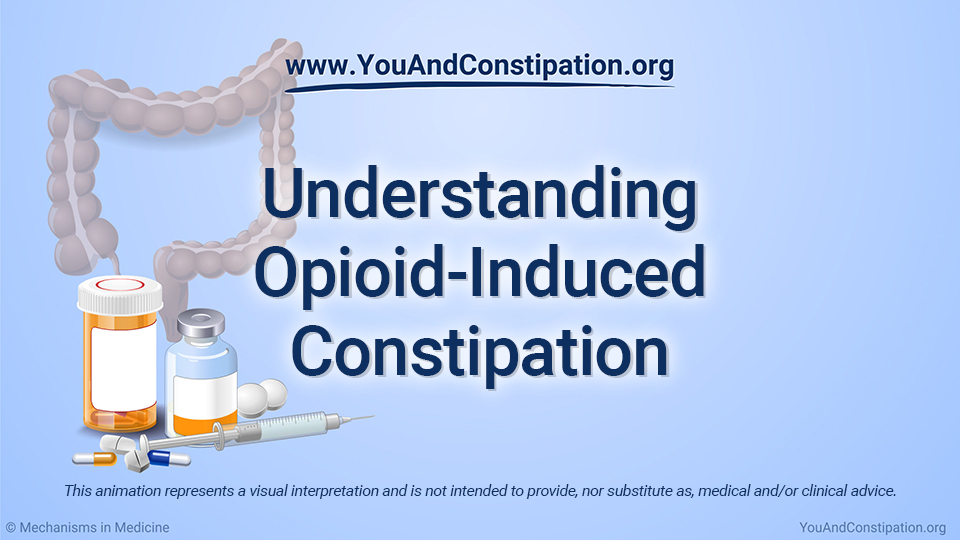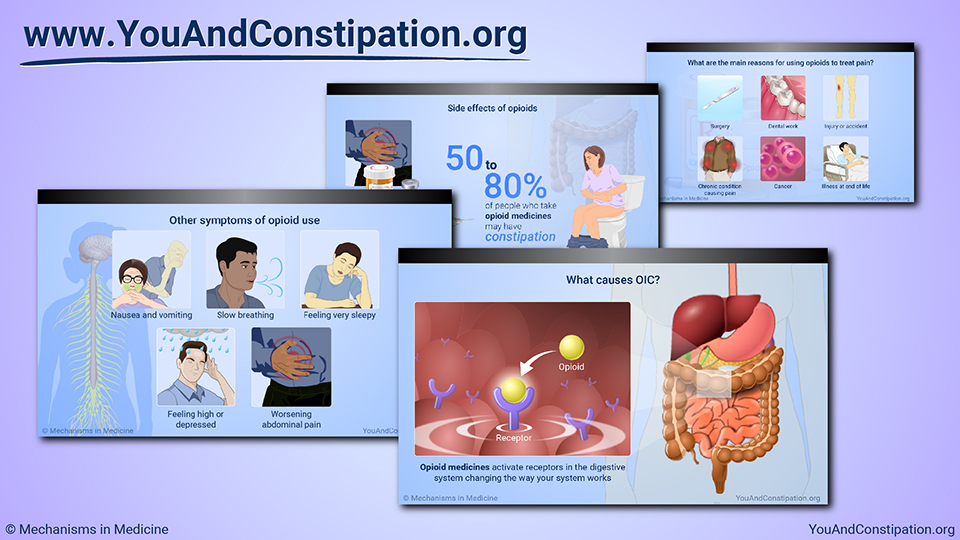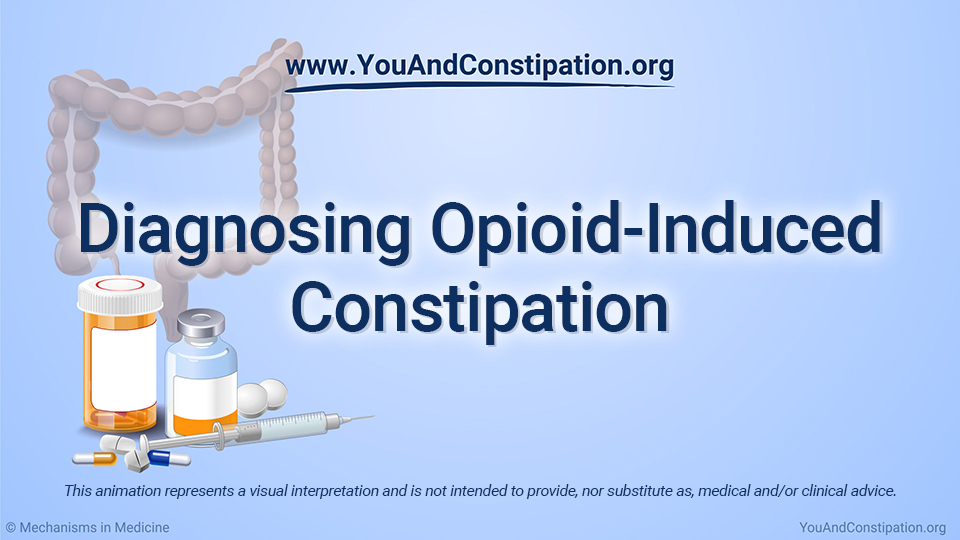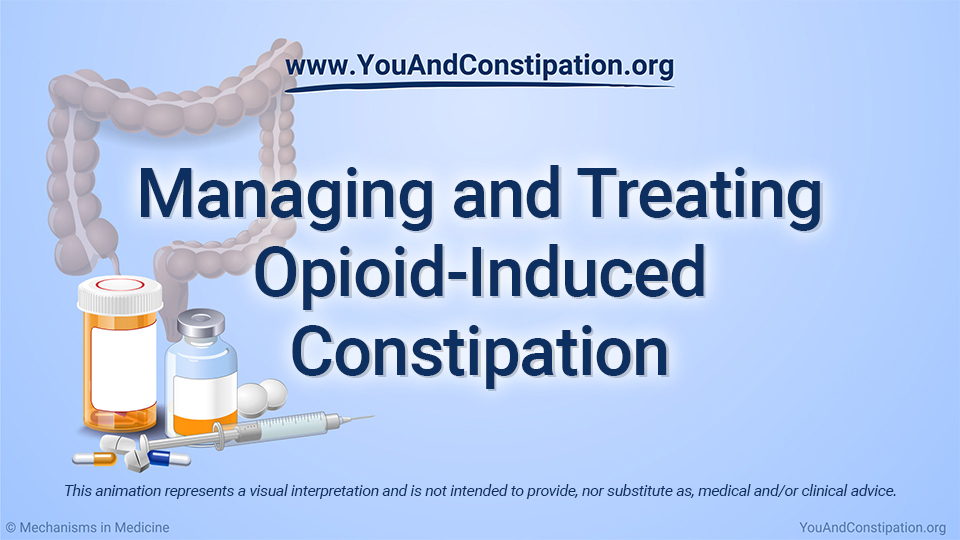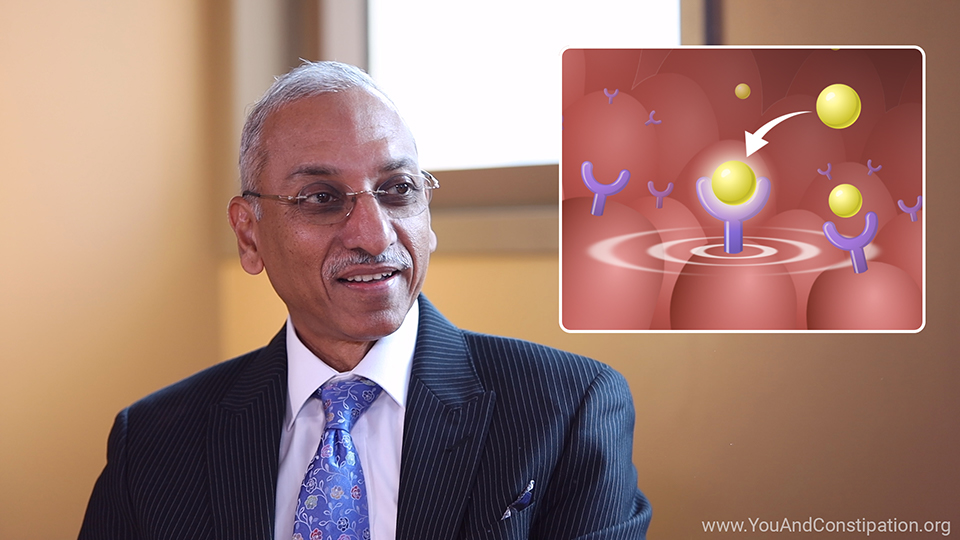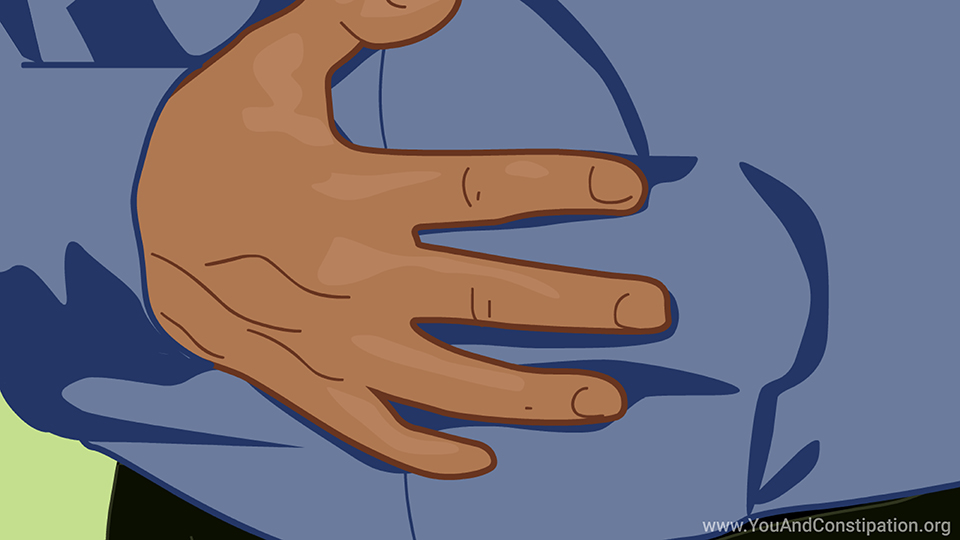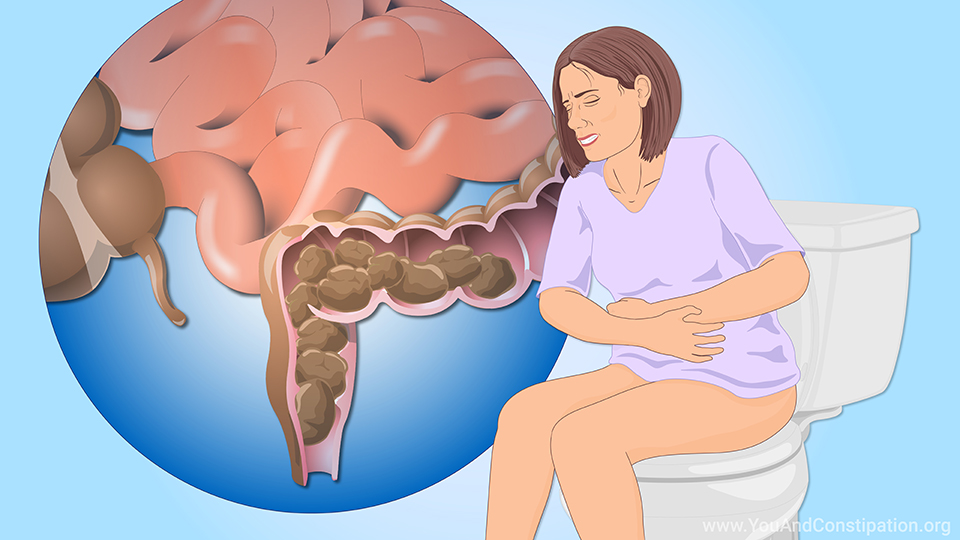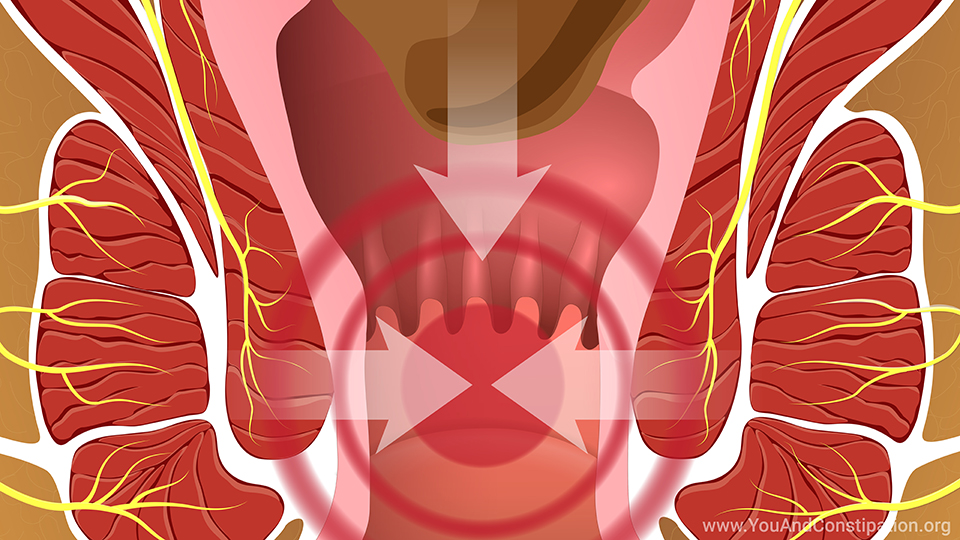Understanding Opioid-Induced Constipation
*Please note: This slide show represents a visual interpretation and is not intended to provide, nor substitute as, medical and/or clinical advice.
What is opioid-induced constipation (OIC)?
Opioid-induced constipation (OIC) is a condition that affects how your digestive system works.
Opioids are strong pain medicines that slow bowel movements, causing fewer bowel movements or more difficulty having a bowel movement than normal.1,2 Hence the term "opioid-induced" constipation
Side effects of opioids
Your physician might prescribe opioids if you have a condition that causes moderate to severe pain.
While opioids can treat pain effectively, they also cause side effects. Between 50 and 80 percent of people who take opioid medicines may have constipation.3
OIC – Most common digestive system side effect of opioids
Opioid-induced constipation is the most common side effect that opioids have on your digestive system. However, there are others. Opioid-induced bowel dysfunction (OIBD) is the medical term for all the digestive system effects that opioids can cause. Besides constipation, OIBD can include heartburn, nausea, vomiting, a bloated feeling, as well as chronic, or long-lasting, abdominal pain.
Who gets OIC?
Anyone who takes opioid medicines can develop opioid-induced constipation.
What are the main reasons for using opioids to treat pain?
Physicians may prescribe opioids for pain from:
- A procedure, such as surgery or dental work.
- An injury or accident.
- A chronic, or long-lasting, condition that causes pain.
- Cancer.
- Illness at the end of life.7
OIC risk factors
Taking opioid medicines is the main risk factor for opioid-induced constipation.
You can lower your risk of OIC, relieve symptoms, or both by talking with your physician and pharmacist before you start taking opioid medicines.10
What are the symptoms of OIC?
The main symptom of OIC is a change in your usual bowel movement habits after you start taking opioid medicines. Changes may include:
- Less frequent bowel movements.
- Difficulty having bowel movements.
- Feeling like you cannot empty everything completely.
- Very firm or hard bowel movements.5
Other symptoms of opioid use
Besides constipation, opioid medicines can cause other side effects. For example, you may have side effects related to your nervous system. These can include nausea and vomiting, slow breathing, feeling very sleepy, and feeling either "high" or depressed.9 You might also have worsening abdominal pain.
What causes OIC?
Your body has areas called "receptors" in the digestive system. When you take opioid medicines, they activate these receptors. This changes the way your digestive system works.
What causes OIC?
Opioid medicines:
- Slow down the normal movement of food and waste through your system.
- Reduce the moisture in your digestive system that makes it easier to have bowel movements.
- Tighten up the muscles that need to relax when you have a bowel movement.
Alarm features of OIC
If you have certain symptoms, your physician will check for other conditions besides OIC. These symptoms can include:
- Unexplained weight loss.
- Frequent fevers.
- Blood in your bowel movements.
- A low red blood cell count, called anemia.
- A history of colon cancer in your family.6
What are the consequences of OIC?
Opioid-induced constipation can be so unpleasant that you stop taking your opioid medicines. But if they are the best for controlling your pain, you might not get the pain relief you need if you stop taking them.
What are the consequences of OIC?
In rare cases, OIC can cause serious health problems, including pain in the rectum, where bowel movements leave the body. It can also cause a blocked or torn bowel. This is serious and can be life-threatening.4,8
If OIC becomes severe
If constipation becomes severe, your physician may prescribe medications such as pills, enemas, or suppositories to relieve it.
OIC can cause other health problems
Having OIC can lead to other health problems, especially in older adults. Problems may include:
- Heart attacks and mini-strokes from struggling to have a bowel movement.
- Depression and other mood problems from discomfort.
- Other digestive system problems – from nausea, to a tear in the digestive system caused by a blockage.11
Questions to ask your physician about OIC
If your physician prescribes opioid medicines, ask how likely your specific medicine is to cause constipation. It is best to prevent OIC, if possible.
Talking with your physician before you start taking opioids is the best way to do this.
References
- About constipation. International Foundation for Gastrointestinal Disorders. Available at https://www.aboutconstipation.org/. Accessed December 2019.
- Ford AC, Moayyedi P, Lacy BE, et al. American College of Gastroenterology monograph on the management of irritable bowel syndrome and chronic idiopathic constipation. Am J Gastroenterol 2014;109(S1):S2-S26.
- Poulsen JL, Brock C, Olesen AE, Nilsson M, Drewes AM. Evolving paradigms in the treatment of opioid-induced bowel dysfunction. Therap Adv Gastroenterol 2015;8(6):360-372. doi:10.1177/1756283X15589526
- Crockett SD, Greer KB, Heidelbaugh JJ, et al. for the American Gastroenterological Association Institute Clinical Guidelines Committee. American Gastroenterological Association Institute guideline on the medical management of opioid-induced constipation. Gastroenterology 2019;156:218-226.
- Drewes AM, Munkholm P, Simrén M, et al. Definition, diagnosis and treatment strategies for opioid-induced bowel dysfunction — Recommendations of the Nordic Working Group. Scand J Pain 2016;11:111-122. doi:10.1016/j.sjpain.2015.12.005. Epub 2016 Feb 4.
- Camilleri M, Drossman DA, Becker G, Webster LR, Davies AN, Mawe GM. Emerging treatments in neurogastroenterology: a multidisciplinary working group consensus statement on opioid-induced constipation. Neurogastroenterol Motil 2014;26(10):1386-1395. doi:10.1111/nmo.12417
- Sizar O, Gupta M. Opioid Induced Constipation. [Updated 2019 Nov 16]. In: StatPearls [Internet]. Treasure Island (FL): StatPearls Publishing; 2020 Jan-. Available from: https://www.ncbi.nlm.nih.gov/books/NBK493184/
- Dowell D, Haegerich TM, Chou R. CDC Guideline for Prescribing Opioids for Chronic Pain—United States, 2016. JAMA 2016;315(15):1624-1645. doi:10.1001/jama.2016.1464
- Davies A, Webber K. Stercoral perforation of the colon: A potentially fatal complication of opioid-induced constipation. J Pain Symptom Manage 2015;50(2):260-262.
- Benyamin R, Trescot AM, Datta S, et al. Opioid complications and side effects. Pain Physician 2008;11(2 Suppl):S105-120.
- Gregorian T, Lewis J, Tsu L. Opioid-induced constipation: Clinical guidance and approved therapies. US Pharm 2017;42(12):15-19.
- Chokhavatia S, John ES, Bridgeman MB, et al. Constipation in elderly patients with noncancer pain: Focus on opioid-induced constipation. Drugs Aging 2016;33(8):557-574. doi:10.1007/s40266-016-0381-2
This slide show provides an overview of
opioid-induced constipation (
OIC), including the
symptoms,
causes,
warning signs and
consequences. Opioids are effective for treating and managing pain, but using them frequently can lead to constipation. This slide show also describes the importance of working with your physician to relieve symptoms and lower your risk of OIC.
-
Share with family and friends:
Click here to take our SURVEY
Your feedback is important to us! We will use your feedback to develop future areas of content about constipation which will help other patients, caregivers and families.
